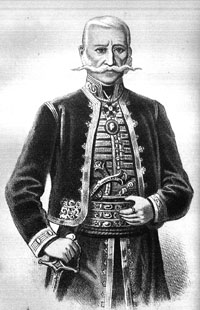Jakov Nenadović
| Jakov Nenadović | |
|---|---|
 |
|
| 1st Interior Minister of Serbia | |
|
In office 1811 – 181X |
|
| Monarch | Karađorđe |
| Preceded by | Position established |
| Succeeded by | Karađorđe |
| President of the Serbian Sovjet | |
|
In office 1809–1811 |
|
| Preceded by | Mladen Milovanović |
| Succeeded by | Karađorđe |
| Personal details | |
| Born | 1765 Brankovina, Ottoman Empire |
| Died | 1836 (aged 71) Vienna, Austria |
| Nationality | Serbian |
| Religion | Serbian Orthodox |
| Military service | |
| Allegiance | Revolutionary Serbia |
| Years of service | 1804–1814 |
| Battles/wars | Svileuva |
Jakov Nenadović (Serbian: Јаков Ненадовић; 1765 – 1836) was the first Serbian interior minister. He played an important role as voivode (military commander) in the First Serbian Uprising against the Turks, along with his nephew, Mateja Nenadović. Nenadović was after Karađorđe and Janko Katić, perhaps the most influential figure in Serbia at the time.
Jakov was the younger brother of Aleksa Nenadović (1749–1804), a Serbian nobleman who held a province around Valjevo. He was grandnephew of Grigorije Nenadović, metropolitan of Raška and Valjevo. His brother was executed in the Slaughter of the Dukes in January 31, 1804, which sparked the First Serbian Uprising.
Jakov immediately joined the Serbian rebels, and after the victory in Svileuva (1804) he became one of the most distinguished commanders and persons of western Serbia. He acquired his ammunitions and weapons from Syrmia, then part of Austria. In March 1804, he attacked Šabac. Jakov was one of the founders of the Praviteljstvujušči sovjet serbski (Serbian government), of which Prota Mateja Nenadović, his nephew (the son of Aleksa), was the first Prime Minister.
In 1813, for the purpose of armory, a tower bearing the Nenadović name was built next to a road leading to Šabac, at the edge of Kličevac hill, by Jakov and his son Jevrem. After the failed uprising, Nenadović followed Karadjordje to Bessarabia in 1814, and in 1816 to Imperial Russia in St. Peterburg to confer with Tsar Alexander I of Russia over the state of affairs in the Balkans, then re-occupied by the Ottoman Turks. Later on, he settled in Vienna, where he died in 1836. His granddaughter, Persida Nenadović (the daughter of Jevrem), married Alexander Karađorđević, Prince of Serbia, the son of Karadjordje.
...
Wikipedia
